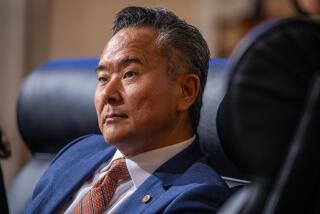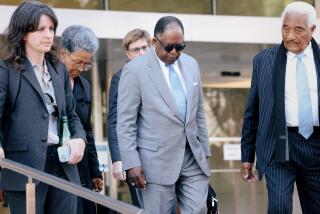Mayor Bargained for Fair Campaign Contract, Ex-Aide Testifies
San Diego Mayor Roger Hedgecock’s former chief of staff testified Wednesday that political consultant Tom Shepard may have been “a stupid businessman” who suffered a heavy financial loss by running Hedgecock’s 1983 race, but emphasized that the deficit could not be construed as an illegal campaign donation because Hedgecock’s campaign had a “fair, valid contract” with Shepard’s firm.
J. Michael McDade, one of Hedgecock’s closest political advisers, testified in the mayor’s felony retrial that because of the contract between Hedgecock’s campaign committee and Tom Shepard & Associates, “it would be inappropriate (and) inaccurate” to describe--as the prosecution does--the overhead expenses of Shepard’s firm as an unreported contribution to Hedgecock.
“If we entered into a fair, bargained-for contract to pay (Shepard) what we thought his services were worth . . . that’s all that’s necessary,” said McDade, who resigned as head of Hedgecock’s City Hall staff in June to become a partner in a local law firm. “If in hindsight (Shepard lost money), there’s no way we could have anticipated that.”
During McDade’s more than three hours of testimony, Deputy Dist. Atty. Charles Wickersham and defense attorney Oscar Goodman focused on the conflicting interpretations of Tom Shepard & Associates’ financial history that lie at the heart of Hedgecock’s felony conspiracy and perjury case.
Prosecutors characterize Shepard’s firm as a political laundry used to funnel allegedly illegal donations from former J. David & Co. principals Nancy Hoover and J. David (Jerry) Dominelli to Hedgecock’s 1983 campaign.
The defense, however, describes Shepard’s firm, founded in January, 1982, as a legitimate business that simply treated Hedgecock’s campaign as a “loss leader” in an attempt to enhance the young firm’s reputation by running a successful citywide campaign.
One of the prosecution’s guiding tenets in the case is the contention that Hedgecock received purportedly illegal contributions from Shepard’s firm in the form of unreimbursed services, staff time and other overhead expenses. A local accounting professor who testified as a prosecution witness last week argued that if a pro-rated share of Tom Shepard & Associates’ overhead expenses had been assigned to the Hedgecock campaign, the firm “lost” more than $130,000 on the race.
McDade, however, said that Shepard’s overhead expenses--as well as Hoover’s and Dominelli’s capital investments in the firm--were “outside the scope” of what Hedgecock needed to report as campaign contributions on his financial disclosure statements. Under state election laws, a consulting firm’s overhead expenses are not considered campaign contributions, provided that the company has a legitimate contract with a political client.
“The issue is whether or not we had a fair and adequate contract with Tom Shepard & Associates,” McDade said. “In my opinion, we had a fair contract. Beyond that, there are no reporting requirements.”
Initially paid a $750-per-month retainer by Hedgecock’s campaign committee, Shepard’s firm later received a 15% commission on all electronic media advertisements purchased on Hedgecock’s behalf--a formula that resulted in a fee of about $30,000 throughout the special May, 1983, mayoral campaign. Whether that fee--which McDade described as generous in light of Shepard’s limited experience as a political consultant--was sufficient to cover the firm’s operating expenses “had no bearing” on Hedgecock’s committee, McDade added.
“If (Shepard) is a stupid businessman, that’s his problem, and (that) would not separate him from other political consultants,” McDade said.
Throughout his testimony, McDade frequently sparred verbally with Wickersham, who persistently tried to get the former Hedgecock chief of staff to concede that Shepard’s firm was rendering unpaid--and, therefore, illegal--services for Hedgecock both prior to and after receiving an August, 1982, contract to run the mayoral campaign. McDade, however, just as doggedly sought to craft his answers in ways that reflected favorably on his close friend Hedgecock.
Wickersham pointed out, for example, that Shepard wrote a series of detailed memos in early 1982 describing preparatory work being done on Hedgecock’s behalf in anticipation of a potential mayoral race, a possibility that became a reality when then-Mayor Pete Wilson won the November, 1982, U.S. Senate race.
McDade, though, characterized those “very speculative” discussions as the kind of casual “what-if” brainstorming common in politics, emphasizing that serious planning for Hedgecock’s mayoral campaign did not begin until after Wilson won the Republican senatorial nomination in June, 1982--and that the race did not become a certainty until Wilson’s general election victory five months later.
“Isn’t it fair to say there was an organization formed during the first six months of 1982, the purpose of which was the ultimate election of Roger Hedgecock as mayor if that office became vacant?” Wickersham asked.
“You could say that in the same context as saying that a first date is a prelude to marriage,” McDade responded. “Until (November) you couldn’t have a campaign, but you sure could have dreams and aspirations.”
Pressing his attack from another angle, Wickersham posed a series of hypothetical questions based on evidence introduced earlier in the trial, including the fact that Shepard’s firm paid for a $2,000 video seminar for Hedgecock, bought pledge cards sent out on his behalf and that the agency’s major employees spent most of their time working on Hedgecock’s race. The prosecutor’s purpose in asking the questions was to attempt to win a concession from McDade that such activities could be classified as illegal campaign contributions.
McDade, however, repeatedly parried Wickersham’s questions, stressing that he regarded the Shepard staffers who worked on Hedgecock’s campaign as volunteers and that he was unaware of how Shepard paid certain campaign-related bills. The closest that McDade came to giving Wickersham the type of answer the prosecutor obviously wanted was to grudgingly concede that some of Shepard’s activities “could be construed as a campaign contribution . . . if I accept each and every hypothetical of your question.”
Visibly upset by McDade’s verbal dexterity, Wickersham at one point told McDade to answer his questions “based on my hypothetical.”
“Can’t we talk about facts?” McDade said--a comment that drew a rebuke from Superior Court Judge William L. Todd Jr.
“No, sir, you just answer the questions,” Todd sternly told McDade.
Wickersham also questioned McDade about a controversial oral-agreement leading to a $130,000 loan Hedgecock received from Hoover to remodel his South Mission Hills house. Contrary to the prosecutor’s suggestion that Hedgecock hastily repaid the loan in February, 1984, to “distance himself” from the J. David firm, then on the verge of collapse, McDade said that Hedgecock’s primary motivation was to prevent liens from being placed on his house by subcontractors who had not been paid for their work.
“That would have been an embarrassment,” McDade said. “It’s not nice for the mayor to have liens on his house.”
Following Wednesday’s court session, Goodman said that McDade’s testimony forms an integral element of the defense’s case.
“Here’s the mayor’s chief of staff, his adjutant, saying that he saw nothing wrong with these activities and that nothing needed to be reported” on the financial reports, Goodman said.
“That’s consistent with our defense, which is there’s nothing wrong with a man who wants to run for political office from trying to get together a group of his supporters who are going to be working in his behalf so that if an opening sometime comes up, he’s going to be able to run,” Goodman added. “If there’s something wrong with that, then we may as well shut down politics in America.”
More to Read
Sign up for Essential California
The most important California stories and recommendations in your inbox every morning.
You may occasionally receive promotional content from the Los Angeles Times.










